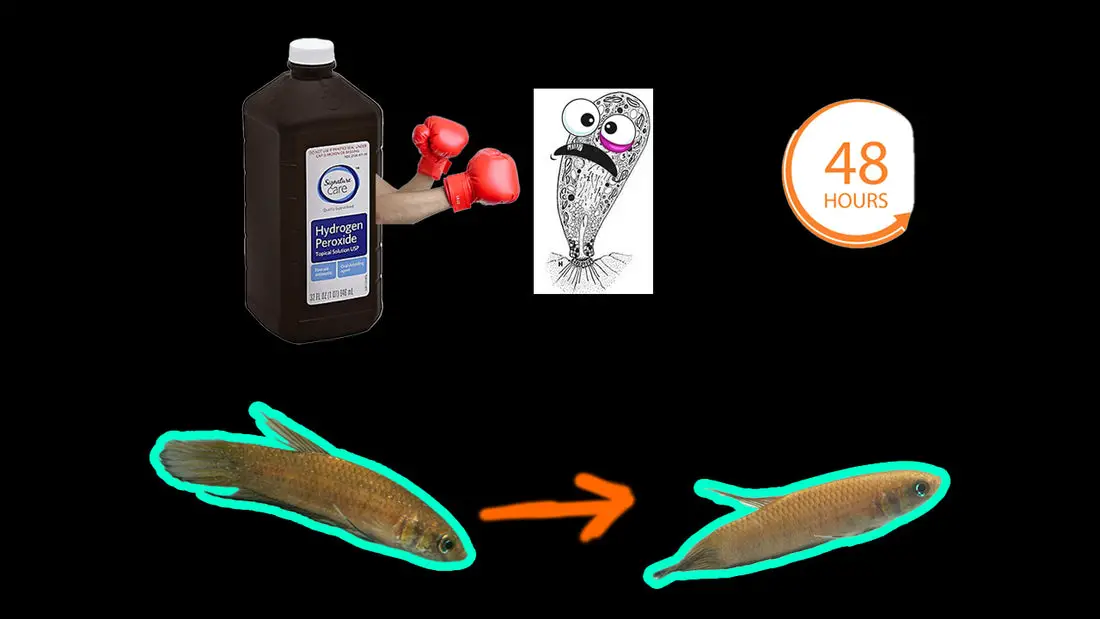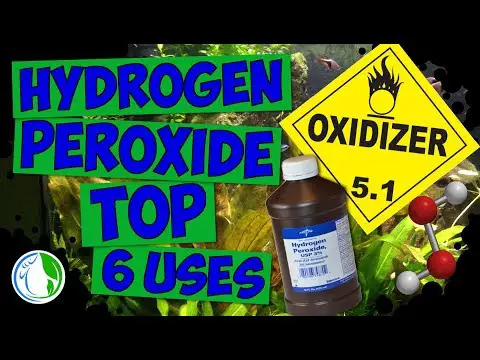Aquariums are delicate ecosystems that require a careful balance of various elements to thrive. One of the most important factors to consider is the presence of beneficial bacteria that help to maintain a healthy environment for your aquatic pets. However, many aquarium enthusiasts wonder whether using hydrogen peroxide as a cleaning agent can harm these good bacteria. In this article, we will explore the effects of hydrogen peroxide on beneficial bacteria in aquariums and provide you with the information you need to make an informed decision about its use.
Hydrogen peroxide is a popular choice for aquarium owners looking to keep their tanks clean and free from harmful bacteria. However, its effectiveness against these microbes has led to concerns about its impact on the beneficial bacteria that keep the aquarium environment healthy. If you’re worried about whether hydrogen peroxide is safe to use in your aquarium, then read on to learn about its effects on the beneficial bacteria that your aquatic pets need to thrive.
Does Hydrogen Peroxide Kill Beneficial Bacteria in Aquarium?
Yes, hydrogen peroxide can kill beneficial bacteria in aquariums if not used properly. It can be used in small quantities for spot treatments but can harm the entire ecosystem if used excessively. To use hydrogen peroxide safely, dilute it with water and apply it directly to the affected area. Monitor the aquarium closely and perform water changes as needed to maintain a healthy balance of bacteria.

Does Hydrogen Peroxide Kill Beneficial Bacteria in Aquarium?
Maintaining a clean aquarium is essential for the health and well-being of your fish. However, sometimes unwanted algae, parasites, and bacteria can grow in the tank, causing harm to your aquatic pets. One common solution to this problem is to use hydrogen peroxide to clean the aquarium. But does hydrogen peroxide kill the beneficial bacteria in the aquarium? Let’s find out.
What is Hydrogen Peroxide?
Hydrogen peroxide is a chemical compound that is commonly used as a disinfectant and antiseptic. It is a colorless liquid that is slightly more viscous than water. Hydrogen peroxide is widely used in aquariums to kill harmful bacteria, parasites, and algae.
How Does Hydrogen Peroxide Work in Aquariums?
Hydrogen peroxide works by oxidizing the cell walls of bacteria, algae, and parasites, causing them to die. When added to aquarium water, hydrogen peroxide breaks down into water and oxygen, making it safe for fish and other aquatic life. It is an effective way to clean the aquarium without harming the fish.
Does Hydrogen Peroxide Kill Beneficial Bacteria?
While hydrogen peroxide is effective at killing harmful bacteria, it can also kill the beneficial bacteria in the aquarium. Beneficial bacteria are essential for maintaining a healthy aquarium ecosystem. They help in breaking down waste products and converting harmful ammonia into less harmful nitrate. If the beneficial bacteria are killed, it can lead to an imbalance in the aquarium, causing harm to the fish.
How to Use Hydrogen Peroxide in Aquariums?
If you decide to use hydrogen peroxide in your aquarium, it is important to use it in the right amount. The recommended dosage is one milliliter of 3% hydrogen peroxide per gallon of water. It is also essential to turn off any filters and air pumps in the aquarium before adding hydrogen peroxide. After adding it, wait for a few hours before turning the filters and air pumps back on.
Benefits of Using Hydrogen Peroxide in Aquariums
Hydrogen peroxide is an effective way to clean the aquarium and get rid of unwanted bacteria, algae, and parasites. It is safe for fish and other aquatic life when used in the right amount. It is also an inexpensive way to maintain a clean and healthy aquarium.
Alternatives to Hydrogen Peroxide
If you are concerned about the use of hydrogen peroxide in your aquarium, there are alternative ways to clean and maintain the tank. One option is to use natural remedies, such as vinegar or baking soda. Another option is to use commercial aquarium cleaners that are specifically designed for aquarium use.
Conclusion: Hydrogen Peroxide and Aquariums
Hydrogen peroxide is an effective way to clean the aquarium and get rid of unwanted bacteria, algae, and parasites. However, it can also kill the beneficial bacteria in the aquarium if not used in the right amount. It is important to follow the recommended dosage and turn off any filters and air pumps before adding hydrogen peroxide to the aquarium. If you are concerned about the use of hydrogen peroxide, there are alternative ways to clean and maintain your aquarium.
Frequently Asked Questions
Does hydrogen peroxide kill beneficial bacteria in aquariums?
Hydrogen peroxide is a common choice for treating various aquarium issues, including algae blooms and bacterial infections. However, it can also have harmful effects on the beneficial bacteria that keep the aquarium’s ecosystem balanced.
Beneficial bacteria play a crucial role in aquariums as they break down toxic ammonia and nitrite into less harmful nitrates. These bacteria are sensitive to hydrogen peroxide, and exposure to higher concentrations of this chemical can kill them off. Therefore, it is essential to use hydrogen peroxide cautiously and in the right amounts to avoid harming the beneficial bacteria.
How can I use hydrogen peroxide in my aquarium without harming beneficial bacteria?
Hydrogen peroxide can be used in aquariums to treat various issues, but it should be used with caution to avoid harming beneficial bacteria. The recommended dosage for hydrogen peroxide is one milliliter per gallon of water. This amount is generally safe for most aquariums and should not harm the beneficial bacteria.
To use hydrogen peroxide, dilute the solution in a container of aquarium water before adding it to the aquarium. Avoid adding it directly to the aquarium, as this can cause sudden changes in water chemistry, which can be harmful to fish and other aquatic life.
What are the signs of hydrogen peroxide overdose in an aquarium?
Overdosing with hydrogen peroxide can have harmful effects on aquariums, including killing beneficial bacteria and harming aquatic life. The signs of hydrogen peroxide overdose in an aquarium include fish gasping for air at the surface, white foam on the water surface, and an increase in water temperature.
If you notice any of these signs, immediately stop adding hydrogen peroxide to the aquarium and perform a partial water change. This will help to dilute the hydrogen peroxide concentration in the aquarium and reduce the harm to aquatic life.
Are there any alternatives to using hydrogen peroxide in an aquarium?
Hydrogen peroxide is a common treatment for various aquarium issues, but it is not the only option. There are several alternatives to using hydrogen peroxide, depending on the specific aquarium issue you are trying to treat.
For example, if you are dealing with an algae bloom, you can try reducing the amount of light the aquarium receives or adding algae-eating fish or snails. For bacterial infections, you can try using antibiotics designed for aquarium use or increasing the water’s temperature to help the fish’s immune system fight off the infection.
Can hydrogen peroxide be used to clean aquarium equipment?
Hydrogen peroxide can be used to clean aquarium equipment, but it is important to use it in the right concentration and to rinse the equipment thoroughly afterward. A solution of one part hydrogen peroxide to ten parts water can be used to clean aquarium equipment, such as filters and hoses.
After cleaning, rinse the equipment thoroughly in clean water to remove any residual hydrogen peroxide before returning it to the aquarium. Failure to rinse the equipment thoroughly can cause harm to fish and other aquatic life in the aquarium.

How does hydrogen peroxide kill algae? Dosing H2O2 in a planted aquarium
In conclusion, the use of hydrogen peroxide in an aquarium can be a tricky topic. While it can be an effective way to treat certain types of infections and algae overgrowth, it can also be harmful to the beneficial bacteria that keep the aquarium healthy. It is important to carefully consider the potential consequences before using hydrogen peroxide in your aquarium.
If you do decide to use hydrogen peroxide, it is crucial to follow the instructions carefully and use it sparingly. Too much hydrogen peroxide can be harmful to your fish and other aquatic life. It is also important to monitor the levels of beneficial bacteria in your aquarium and take steps to replenish them if necessary.
Ultimately, the decision to use hydrogen peroxide in your aquarium is up to you. With careful consideration and proper use, it can be a helpful tool in maintaining a healthy and thriving aquatic environment. However, it is important to always prioritize the well-being of your fish and other aquatic life, and to take steps to minimize any potential harm.
